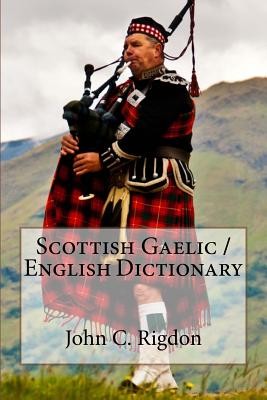
- We will send in 10–14 business days.
- Author: John C Rigdon
- Publisher: CreateSpace Independent Publishing Platform
- ISBN-10: 1537718290
- ISBN-13: 9781537718293
- Format: 15.2 x 22.9 x 1.7 cm, softcover
- Language: English
- SAVE -10% with code: EXTRA
Reviews
Description
In an area the size of Alabama we have a half-dozen "lesser" languages spanning the northern half of the United Kingdom, all dominated by English, but both historically, and orthographically having little in common and they are to a large part mutually unintelligible. Scottish Gaelic is closely related to Manx and Irish (Gaelic) and was brought to Scotland around the 4th century AD by the Scots from Ireland. Scottish Gaelic is also distantly related to Welsh (Cymraeg), Cornish (Kernewek) and Breton (Brezhoneg), which form the Brythonic branch of the Celtic languages, also known as P-Celtic.
The Celtic languages all have a similar grammatical structure, but have relatively little vocabulary in common. By ranking of speakers they are: - Scots (sco) 1.5 million speakers- Irish (gle) 1.1 million speakers- Scots-Gaelic (gla) 87,000 speakers
Scottish Gaelic was spoken throughout Scotland (apart from small areas in the extreme southeast and northeast) between the 9th and 11th centuries, but began to retreat north and westwards from the 11th century onwards. Today, Scottish Gaelic is spoken in Scotland (Alba), mainly in the Highlands (a' Ghaidhealtachd) and in the Western Isles (Na h-Eileanan an Iar),
EXTRA 10 % discount with code: EXTRA
The promotion ends in 19d.13:10:24
The discount code is valid when purchasing from 10 €. Discounts do not stack.
- Author: John C Rigdon
- Publisher: CreateSpace Independent Publishing Platform
- ISBN-10: 1537718290
- ISBN-13: 9781537718293
- Format: 15.2 x 22.9 x 1.7 cm, softcover
- Language: English English
In an area the size of Alabama we have a half-dozen "lesser" languages spanning the northern half of the United Kingdom, all dominated by English, but both historically, and orthographically having little in common and they are to a large part mutually unintelligible. Scottish Gaelic is closely related to Manx and Irish (Gaelic) and was brought to Scotland around the 4th century AD by the Scots from Ireland. Scottish Gaelic is also distantly related to Welsh (Cymraeg), Cornish (Kernewek) and Breton (Brezhoneg), which form the Brythonic branch of the Celtic languages, also known as P-Celtic.
The Celtic languages all have a similar grammatical structure, but have relatively little vocabulary in common. By ranking of speakers they are: - Scots (sco) 1.5 million speakers- Irish (gle) 1.1 million speakers- Scots-Gaelic (gla) 87,000 speakers
Scottish Gaelic was spoken throughout Scotland (apart from small areas in the extreme southeast and northeast) between the 9th and 11th centuries, but began to retreat north and westwards from the 11th century onwards. Today, Scottish Gaelic is spoken in Scotland (Alba), mainly in the Highlands (a' Ghaidhealtachd) and in the Western Isles (Na h-Eileanan an Iar),


Reviews